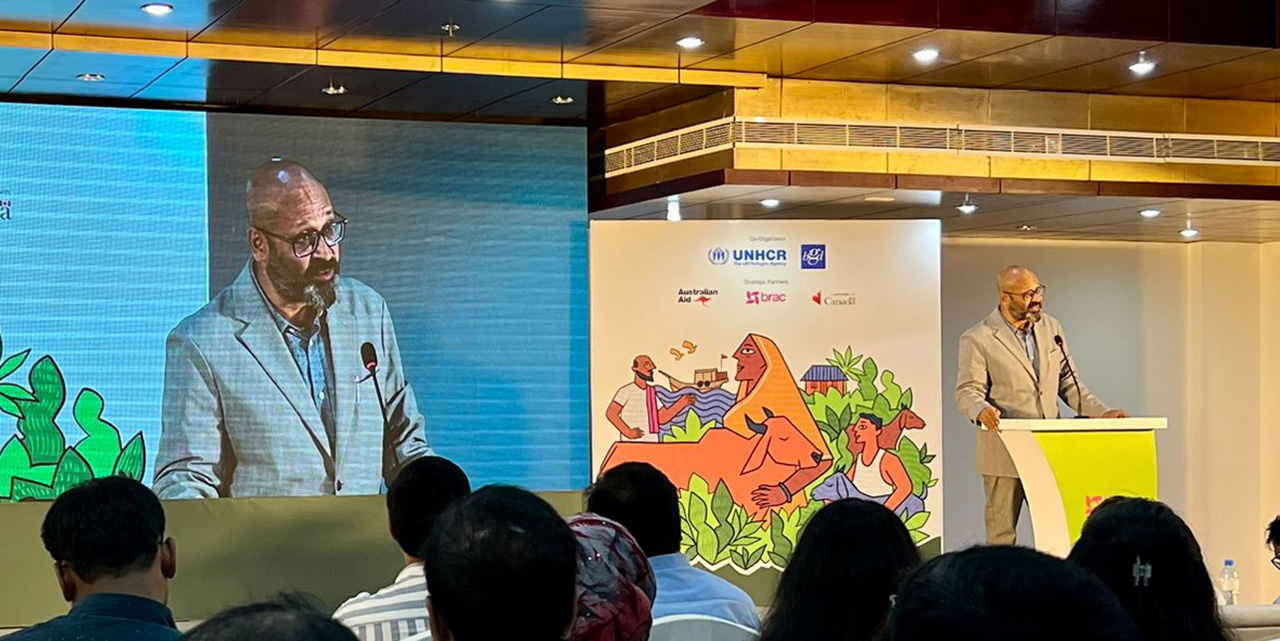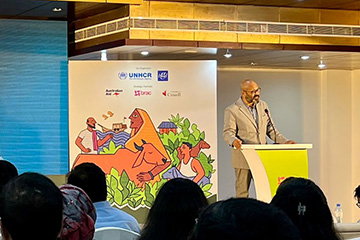
Over 900 thousand Myanmar nationals from the Rohingya community crossed over to Ukhya and Teknaf in Cox's Bazar in 2017, facing persecution and decimation. The situation exacerbated the life and livelihood crisis of the local ultra-poor host community in Cox’s Bazar, a district already burdened with high incidence of poverty.
In this context, the BRAC Ultra-Poor Graduation Programme (UPG) has been assisting ultra-poor women and their families in overcoming poverty. The program employs an approach that deeply and comprehensively understands their vulnerabilities, risks, and needs. As part of this initiative, BRAC recently implemented a pilot project with the objective of establishing stronger linkages between the ultra-poor and the local market, enabling them to sell their products effectively.
An event was arranged in Cox's Bazar to share the learnings of this pilot initiative implemented by the UPG programme. BRAC, BRAC Institute of Governance and Development (BIGD), and the United Nations High Commissioner for Refugees (UNHCR) organised the event on Tuesday (20 June) at a local hotel.
Dr. Narayan C. Das, associate professor and senior research fellow at the BRAC Institute of Governance and Development (BIGD), BRAC University, presented the findings of research on a programme run by UPG in Cox's Bazar since 2018. According to the findings, the participating families continue to achieve socio-economic progress at a rate of 96 per cent. During this time period, they have made significant growth in earnings, savings, wealth, and food security.
Dr. Imran Matin, executive director of the BRAC Institute of Governance and Development (BIGD), BRAC University, observed that there is a lack of solid data and evidence-based work in humanitarian contexts worldwide. BRAC's research sets a significant example in this regard.
Palash K Das, director of the UPG programme at BRAC, stated that the one-year market linkage pilot was implemented jointly by BRAC and UNHCR. The project had a two-fold objective: to increase the bargaining opportunities for the ultra-poor with market actors and to widen the scope for marketing the commodities they have produced. A total of 2,000 members from ultra-poor families participated in this pilot initiative.
Palash K Das further observed that the ultra-poor families living in the humanitarian context after the Rohingya influx gained economic growth through multifaceted support from the UPG programme. However, women from these families have limited access to the market as it is not stable. The main objective of the pilot initiative is to assist the women producers of ultra-poor families in achieving sustainable livelihoods and social integration by linking them with the mainstream economy.
The UPG director also mentioned that since the participants of the pilot project had very limited assets, they could not benefit much by operating individually in the market. Instead, they benefited more by moving into the market as a group, both for purchasing raw materials and selling their products. The project, in addition to organising various training programmes to improve market management capacity, also linked the participants with raw material sellers and product buyers. The project also helped improve their access to different services provided by the government and non-governmental organisations.
Md. Nasim Ahmed, additional deputy commissioner of Cox's Bazar, stated that the government has undertaken a number of poverty eradication and social protection programmes for people living in poverty across the country. However, Cox's Bazar, with a higher poverty rate and multidimensional complexities, requires collaboration from the government, non-governmental organisations, and private sectors to address its issues.
Subrata Kumar Chakrabarty, livelihood and economic inclusion officer at UNHCR, mentioned that the pilot project has provided important learnings for both BRAC and UNHCR. He recommended that future poverty eradication programmes should include market linkage aspects in their activities.
Farzana Zahid, senior development advisor (Rohingya response) at the High Commission of Canada, shared that she had conversations with members of the UPG programme who told her that earlier, people and neighbours did not invite them to attend social gatherings or events. But now, after their economic conditions have improved, they receive invitations.
Robert Stoelman, interim head of the Sub Office at UNDP, observed that the UPG programme has helped improve the lives and livelihoods of ultra-poor families, which in turn improves their social status.
Rozina Haque, associate director of the Ultra-Poor Graduation programme, delivered the closing remarks, stating that BRAC will incorporate the observations and recommendations brought up during today's event into its future initiatives.
Sheuly Sharma, executive director of a Cox's Bazar-based NGO, Jago Nari Unnayan Sangstha, also spoke at the event.
For over 20 years, the BRAC UPG programme has been working to enable the extreme poor in the country to lift themselves sustainably out of the state of destitution associated with ultra-poverty. According to the World Bank's definition, the extreme poor live on less than USD 2.15 per person per day. These individuals often lack access to food, education, basic services, and the skills needed to develop a sustainable livelihood. Since 2002, the UPG programme, a flagship of BRAC, has continuously adapted the graduation approach to meet the changing needs of people living in ultra-poverty and destitution. Inspired by the concept of "Leaving No One Behind," the programme has customised interventions for climate change adaptation, disability inclusion, urban poverty reduction, indigenous community inclusion, and more.









